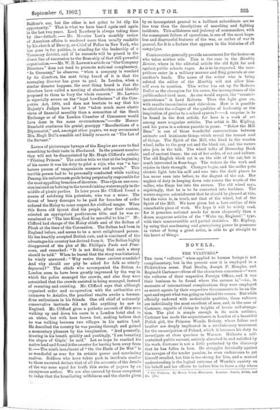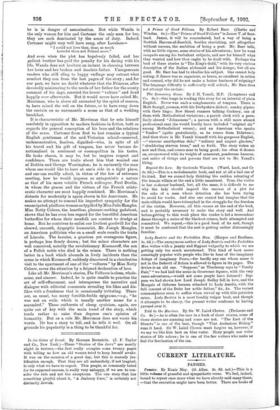NOVELS.
THE VULTURES.*
THE term " vultures " when applied to human beings is not complimentary, but in the present case it is employed in a Pickwickian sense. Paul Deaths, Joseph P. Mangles, and Reginald Cartoner—three of the characters concerned—" were the vultures of their respective Foreign Offices, and it was their business to be found where the carcase is,"—i.e., in moments of international complications they were employed as secret agents by their respective Governments to be on the spot and report what was going on behind the scenes. But while officially endowed with undesirable qualities, these vultures are individually the most excellent of men, and, in the case of Cartoner, capable of rising to heights of heroic self-abnega- tion. The plot is simple enough in its main outlines. Cartoner has made the acquaintance in London of a beautiful Polish girl, the Princess Wanda Bukaty, whose father and brother are deeply implicated in a revolutionary movement for the emancipation of Poland, which it becomes his duty to investigate at close quarters in Warsaw. Hitherto a self- contained public servant, entirely absorbed in and satisfied by his work, Cartoner is not a little perturbed by the discovery that be has fallen in love. He struggles heroically against the ravages of the tender passion, he even endeavours to get himself recalled, but fate is too strong for him, and a mutual understanding is the logical outcome of Wanda's anxiety on his behalf and her efforts to induce him to leave a city where • The Vultures. By Henry Sctou Merriman. Loudon: Smith, Elder, ant Co. (his.)
he is in danger of assassination. But while Wanda is the only woman for him and Cartoner the only man for her, they are each dominated by the sense of duty. Indeed, gartoner might very well have sung, after Lovelace- .
" I could not love thee, dear, so much
Lovedst thou not Poland more."
And even when the plot has hopelessly failed, and her gallant brother has paid the penalty for his daring with his life, Wanda does not hesitate an instant in choosing between her lover and her broken and desolate father. Unregenerate readers who still cling to happy endings may extract what comfort they can from the last pages of the story ; and for our part, we have no doubt whatever that the Princess, after devotedly ministering to the needs of her father for the scanty remnant of his days, married the heroic " vulture " and lived happily ever afterwards. But it would never have suited Mr. Merriman, who is above all animated by the spirit of reserve, to have raised the veil on the future, or to have rung 'down the curtain on so unromantic a scene as that of a wedding breakfast.
It is characteristic of Mr. Merriman that he sets himself resolutely in opposition to modern fashions in fiction, both as regards the general conception of his hero and the relations of the sexes. Cartoner from first to last remains a typical English gentleman of the mid-Victorian school—reserved, undemonstrative, fearless, dignified—who, in spite of all his travel and his gift of tongues, has never become de- nationalired in sentiment or cosmopolitan in his tastes. He lacks charm, it may be, but he inspires respect and confidence. There are traits about him that remind one of Dobbin and George Warrington; he is eminently the man whom one would like to have at one's side in a tight place, and one can readily admit, in virtue of the law of extremes meeting, how he would impress so antagonistic a nature
as that of his more volatile French colleague, Paul Deulin, in whom the graces and the virtues of the French aristo- cratic character are most happily combined. Mr. Merriman's distaste for modernity is again shown in his Americans. He makes no attempt to conceal his imperfect sympathy for the emancipated, platform woman as typified by Miss Julie Mangles. Miss Netty Cahere, the heartless, pleasure-seeking gadabout, shows that he has even less regard for the beautiful American butterflies for whom their menfolk are content to drudge at home. But he contrives to enlist our liveliest goodwill for the shrewd, uncouth, dyspeptic humourist, Mr. Joseph Mangles, an American politician who on a small scale recalls the traits of Lincoln. The heroine, a gracious yet courageous figure, is perhaps less firmly drawn ; but the minor characters are well conceived, notably the revolutionary Kosmaroff, the son of a Polish noble who died in the mines. There is nothing better in a book which abounds in lively incidents than the scene in which Kosmaroff, suddenly discovered in a clandestine visit to the apartment of one of the " vultures " by Miss Netty Cahere, saves the situation by a feigned declaration of love.
Like all Mr. Merriman's stories, The Vultures is clean, whole- some, and sincere. Indeed, he is quite unable to practise the art of self-effacement, and intersperses the narrative and dialogue with editorial comments revealing his likes and dis- likes with a frankness that is occasionally irritating. There are, as usual, too many forcible-feeble epigrams,—e.g., "he was not an exile, which is usually another name for a scoundrel." These outbursts of cheap cynicism, again, are quite out of key with the main trend of the story, which tends rather to raise than depress one's opinion of humanity. But as a rule Mr. Merriman does not waste his words. He has a story to tell, and he tells it well. On all grounds his popularity is a thing to be thankful for.







































 Previous page
Previous page